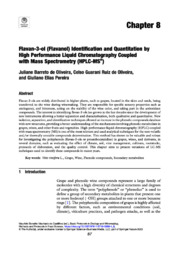Flavan-3-ol (Flavanol) identification and quantitation by high performance liquid chromatography coupled with mass spectrometry (HPLC-MSn).
Flavan-3-ol (Flavanol) identification and quantitation by high performance liquid chromatography coupled with mass spectrometry (HPLC-MSn).
Author(s): OLIVEIRA, J. B. DE; OLIVEIRA, C. G. R. de; PEREIRA, G. E.
Summary: Flavan-3-ols are widely distributed in higher plants, such as grapes, located in the skins and seeds, being transferred to the wine during winemaking. They are responsible for specific sensory properties such as astringency, and bitterness, acting on the stability of the wine color, and taking part in the antioxidant compounds. The interest in identifying flavan-3-ols has grown in the last decades since the development of new instruments allowing a better separation and characterization, both qualitative and quantitative. New isolation, separation, and identification techniques allowed an increase in the phenolic compounds database with new structures, providing a better understanding of the mechanisms involving phenolic metabolism in grapes, wines, and other fruits and vegetables. High-performance liquid chromatography (HPLC) coupled with mass spectrometry (MS) is one of the most relevant and used analytical techniques for the non-volatile and/or thermally unstable compounds determination. This method has shown to be valuable and robust for investigating the polyphenols (flavan-3-ols or proanthocyanidins) in grapes, wines, and derivates, in several domains, such as evaluating the effect of climate, soil, vine management, cultivars, rootstocks, protocols of elaboration, and the quality control. This chapter aims to present variations of LC-MS techniques used to identify these compounds in recent years.
Publication year: 2023
Types of publication: Book sections
Unit: Embrapa Grape & Wine
Keywords: Grapes, Phenolic compounds, Secondary metabolites, Vitis vinifera L, Wines
Observation
Some of Embrapa's publications are published as ePub files. To read them, use or download one of the following free software options to your computer or mobile device. Android: Google Play Books; IOS: iBooks; Windows and Linux: Calibre.
Access other publications
Access the Agricultural Research Database (BDPA) to consult Embrapa's full library collection and records.
Visit Embrapa Bookstore to purchase books and other publications sold by Embrapa.

